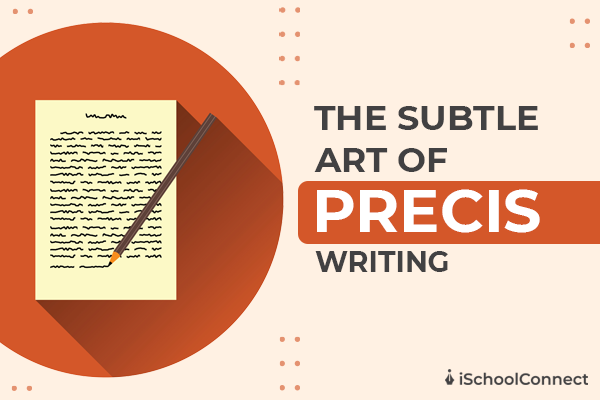Table of Contents
Precis writing | Why is it important?
Every businessman and senior executive is busy competing in today’s industry. They have limited time to read correspondence, newspapers, magazines, journals, government announcements, and other materials. They require communication’s major points as well as other materials. As a result, a person is required to read the entire passage and summarise the most relevant points. This is the part where precis writing plays a role. Let’s look at what precis writing is, as well as some examples, tips, and a practice worksheet to help you improve your writing skills.
What is Precis writing?
Precis writing is a compression exercise. A precis is a summary of a passage written in as few words as feasible. A precis should include all key facts from the original paragraph so that anyone reading it may understand the original passage’s main concept. When writing a synopsis, you must be objective and stick to the passage’s thesis without omitting vital details. To conclude what is significant in an article or a story, attentively read the passage. It may take a while to read it the first time, but as you continue to read it, it may become a simple skim over the pages. To convey the same meaning in such a little space, precise writing demands a thorough understanding of the story/text.
Use of Precis writing

People frequently want to go over the highlights of books, movies, meetings, articles, reports, and news, among other things. When using precis writing, the goal is to communicate the important ideas to the audience without changing the proportion, tone, or theme of the article. In the following fields, precis writing is essential:
- Students can learn the gist of a chapter by using precis writing to describe it.
- Companies use precis writing for job descriptions, meeting highlights, and other purposes.
- In movies, precis writing is used to describe the main events or plot of the movie.
- Scientific reports and research also require precis writing to convey the gist of their contents.
How to write good Precis?
Because of the need to keep a synopsis concise, creating a precis necessitates a thorough understanding of the elements that will give the vital highlights of the content. It may appear simple, but understanding and maintaining important points of the topic demands strong skills and a lot of creativity. Here are some simple methods to help you write a clear precis.
1. Recognize the text/narrative
The most important element to remember is to read the text several times. It’s likely that you overlooked something or misunderstood something. It can take you through some ignored areas and further clarify some points if you read it repeatedly. After a few readings, you will be able to quickly connect the ideas and mentally construct an outline of the content.
2. Highlight and divide the text
Divide the text into smaller sections and use a highlighter to draw attention to the most important facts for future reference. Create an order for the words so that each occurrence is lined up and the points are not muddled.
3. Make a mind map
Have a rough outline or a mind map with all the points you think are important before you start writing your summary. Read it and see how it compares to the text. You might want to add/omit some points to make it more clear. Make sure your outline corresponds to the text’s order.
4. Creating your precis
Begin writing your precis, keeping in mind that the text is as short as possible by utilizing shorter phrases and eliminating duplication. Make a note of how many words your precis has. It should be about a quarter of the main text. The following are the four major aspects to keep in mind while you write your precis:
- Make a title for your precis that is appropriate for the topic.
- It should be written from the perspective of the third person.
- The text should be written indirectly.
- Use the correct past tense.
5. Examine your precise
Check your precis for faults and grammatical mistakes several times. Check it against the original text to see if both compositions have the same themes and convey the same message. In the conclusion, put a bracket around the number of words you used in your precis.
Precis writing rules
Let’s look at a few pointers to assist you in acing your precis now that you know how to create it.
- Keep your text brief and to the point.
- Make your sentences shorter. Use ‘because’ instead of ‘owing to,’ ‘although’ instead of ‘even though,’ etc.
- Make sure your text is easy to follow. Use simple phrases and avoid jargon.
- Your writing should be a scaled-down version of the original text, complete with accurate facts and numbers.
- Keep the most important parts of the text intact.
Types of Precis writing

Concentrate, Comprehend and Condense.
There are four categories of precis writing:
- Precis of Speech: This is the type of Precis in which you keep the original idea but provide a summary of the passage in your voice.
- Precis of Continuous Matter: Every sort of matter falls under the continuous matter, except communication. Evidence reports, question-and-answer forms, and parliamentary reports are all examples. The date of the passage is not included in this Precis.
- Precis of Correspondence: The two types of Precis correspondence are Index Precis and Narrative Precis. The index precis is provided as a table, whereas the narrative precis is descriptive.
- Telegraphese: This is a telegram-style summary that uses lesser words and while doing so, keeps the passage’s original meaning and message intact
Key takeaways
- Precis writing is one of the most effective ways to get the gist of a long-written document for commercial purposes.
- Writing a precis is to concisely convey the essential idea of a paragraph to the reader.
- It is important that the precis you have prepared is reasonable and makes sense.
- Make a list of the main elements you want your precis to address before you start writing it.
Hope you are now well equipped to write a well-organized precise. In case of any queries, reach out to us or drop a comment below!
Liked this blog? Read next: Article writing format for beginners
FAQ
Q1. In precis writing, what should be avoided?
Answer- Avoid utilizing abbreviations, asking questions in your synopsis, expressing your perspective, making it too long, and employing sophisticated jargon while writing a decent precis.
Q2. What writing style should be used while composing a precis?
Answer- The writing style should be formal, and there should be no grammatical mistakes. It must be concise and to the point. The diction should be clear and consistent.
Q3. What can be the maximum length of a precis?
Answer- A precis is a summary of a passage. As a result, it should be between 100 to 200 words.







